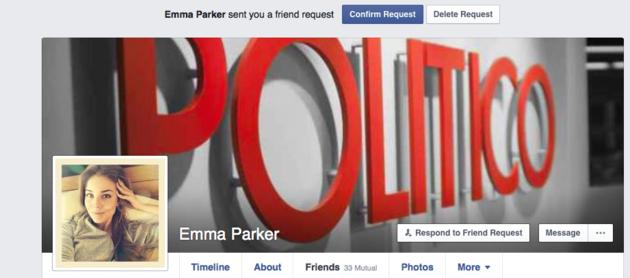By now, you may have heard of Emma Parker. Well, you should have. She made the headlines on numerous major online publications, like the Huffington Post for example. Emma is a journalist at the well-known political news website, Politico.
She befriended dozens of journalists from other major news publishers, like the Guardian or the New York Times. Makes sense for a journalist, right? Sure. Except that Emma Parker isn’t really a journalist at Politico. In fact, she doesn’t really exist.
Also Read: Facebook Tells You When Your Friends Have Shared New Content
Emma Parker is the latest case of fake profiles claiming to be someone famous or important, to befriend journalists, politicians or other celebrities, on Facebook.
If you like our stories, there is an easy way to stay updated:
Follow @wersm
But the profile of Emma got noticed when she was found to aggressively targeting real journalists on Facebook.
There is no Emma Parker at Politico, Google image searching her photo shows it is often used, and she’s friending lots of journalists. hmmmm
— Daniel Victor (@bydanielvictor) January 15, 2016
Just got a friend request from someone named "Emma Parker" at Politico who doesn't exist & is trying to friend a lot of fellow journalists
— Ben Jacobs (@Bencjacobs) January 16, 2016
The motivations behind these actions are not clear – it could just be some amateur journalist trying to gain contacts and/or attention – Nevertheless, “Emma” managed to become Facebook friends with editors and reporters from the New York Times, the Washington Post, Daily Beast, Time Magazine, Newsweek, Bloomberg, Vanity Fair, The Huffington Post, CNN, ESPN, Buzzfeed, and of course Politico itself. Before her profile was finally identified, and removed by Facebook.

Fake profiles are not a new thing on Facebook. There are thousands of them, and Facebook is working hard to get rid of them everyday.
Jason White, in charge of Strategic partnerships, News and Broadcasting at Facebook, explained:
[quote]Fake accounts are against our policy. People use Facebook to connect with real people. We have sophisticated systems to remove fake accounts from Facebook. These include a combination of automated and manual systems to block accounts used for fraudulent purposes such as generating fake clicks or followers, and we are constantly improving these systems to help us better identify suspicious behaviour.[/quote]
How do you decide if a profile looks fake on Facebook? Do you usually take the time to report it to Facebook?
